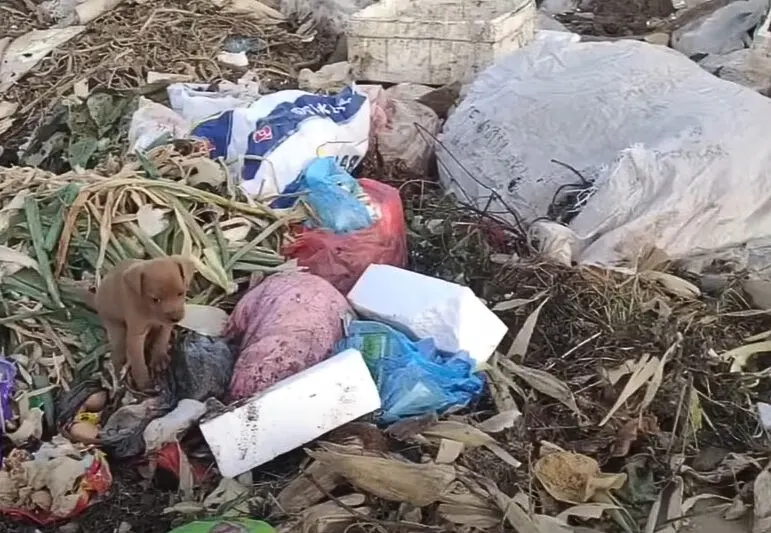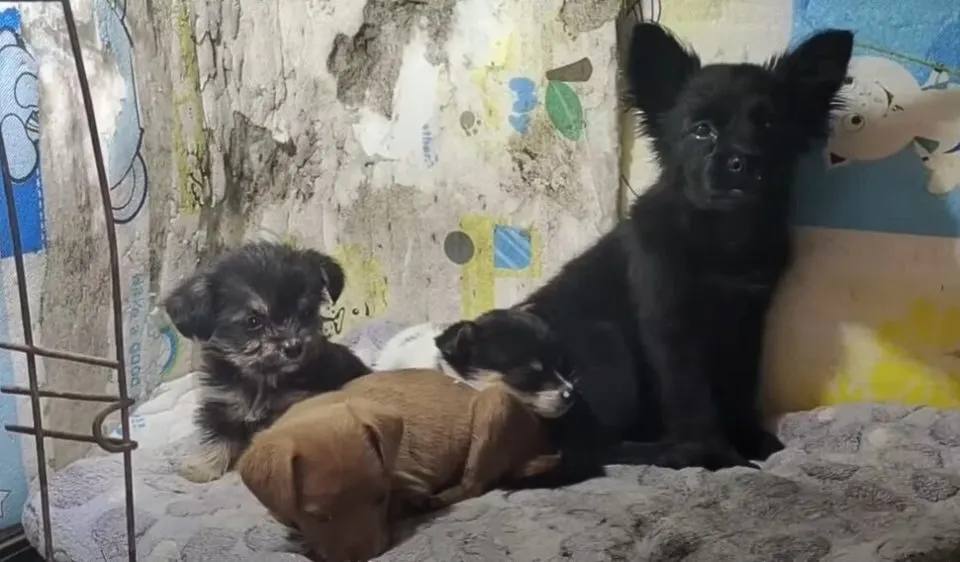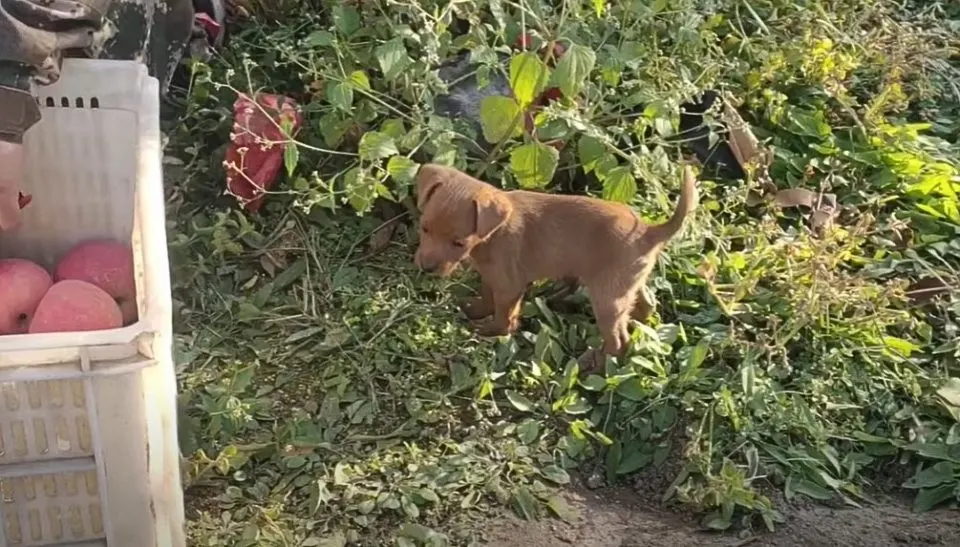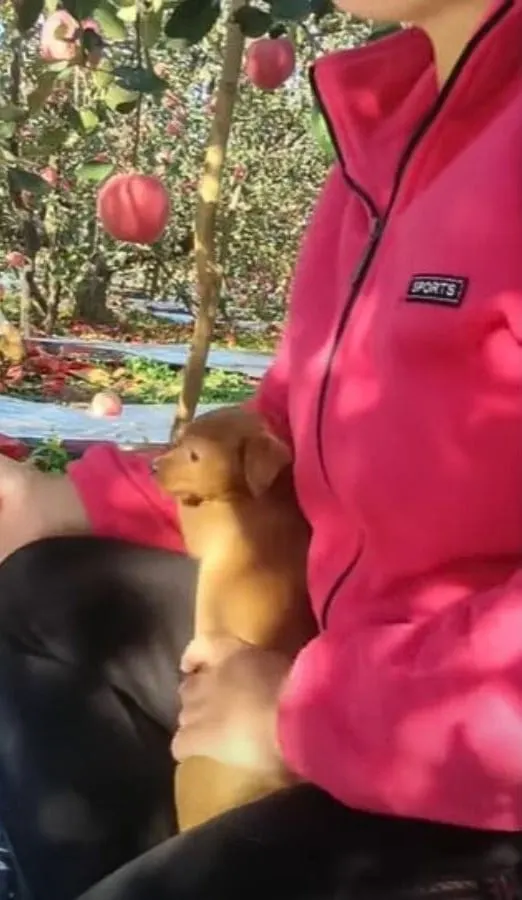For stray pups, every day they spend on the streets is a struggle to survive. Hungry and lonely, they tirelessly search for scraps of food.
They would give anything to have a real home. They long for human parents who would give them the love they always wished to have.
A little brown puppy who lived in a garbage dump knows exactly how it feels to live without love. Like all other stray dogs, he had nobody to rely on, and he fought to survive day after day.
Sadly, the adorable little fur baby spent his days sifting through the garbage dump. He was trying to find morsels of food. After he didn’t find any food, he started eating garbage bags.
A Rescuer Comes Across The Little Puppy

Fortunately, a rescuer happened to be passing by that road. He found the little boi who lived in the garbage dump. His heart sank when he realized that the adorable puppy was so hungry that he ate plastic bags.
The kind rescuer lifted him up and took him in his arms. The sweet fur baby was looking at him with eyes filled with sadness. He longed to have a loving home and humans who would shower him with love.
The puppy was frightened and couldn’t stop shaking. The Good Samaritan who found him didn’t know his backstory. He wondered how long the puppy had lived on a rubbish heap.
He Takes The Sweet Canine Home

The rescuer took him home. He hoped that the pup would relax after he spent time with his other rescue dogs.
Since the puppy was infested with worms, his rescuer dewormed him. Shortly afterwards, the wonderful canine stopped trembling. He was no longer afraid.
The other rescue dogs welcomed him and they all snuggled up to each other. The pup felt safe and cared for.
He became playful and happy. His once sad eyes were now radiating with joy.
The Love He Searched For

It didn’t take long for the delightful puppy to find a forever family.
His caregiver took him to his new home, and his family fell in love with him the moment they saw him. They stroked him and the puppy felt overjoyed. He finally had the loving home he always wanted.

The puppy couldn’t contain his happiness. While his family was working in the orchard, the wonderful fur baby enjoyed exploring the surroundings. His tail wagged as he was running around and enjoying the beautiful nature.
The rescuer said goodbye to the little boi, wishing him all the happiness in the world. The pup licked his hand as if he wanted to thank him for saving his life.
We’re grateful to the puppy’s rescuer and to all other good humans who rescue stray canines and help them find the home they deserve.
If you’ve ever found yourself puzzled by your furry friend’s sudden lack of appetite, you’re not alone. As a seasoned dog trainer, I’ve encountered countless pet parents facing the same dilemma. Picture this: your pup, usually eager for mealtime, now turning up their nose at their favorite dish. It can be concerning and leave you wondering what could be causing this change in behavior.
When your four-legged companion refuses to eat, it’s essential to pay attention to their signals. Dogs communicate through their actions, and a loss of appetite could indicate a variety of underlying issues. From minor reasons like pickiness or stress to more serious health concerns, understanding the reasons behind your dog’s reluctance to eat is crucial for their well-being. So, let’s unravel the mystery together and explore the possible factors influencing your dog’s eating habits.
Understanding the Issue: Why Won’t My Dog Eat?
Common Reasons for Loss of Appetite in Dogs
If your dog isn’t eating as usual, it’s essential to consider a few potential reasons that might be causing this behavior. Stress, changes in routine, or simply being picky are common factors that can lead to a temporary loss of appetite in dogs. Keep an eye out for any recent changes in your dog’s environment or diet that could be causing them to eat less.
When to Be Concerned About Your Dog’s Eating Habits
While occasional fluctuations in appetite are normal for dogs, consistent refusal to eat or a sudden change in eating habits could indicate an underlying issue that requires attention. If your dog continues to show disinterest in food for more than a day or two, it’s a good idea to consult with a veterinarian to rule out any potential health concerns. Your vet can provide guidance on how to address the problem and ensure your furry friend stays healthy and happy.
Health-Related Causes of Inappetence in Dogs
Dental Problems and Pain
If your dog suddenly refuses to eat, dental issues could be a culprit. Check for signs like bad breath, swollen gums, or difficulty chewing. Tooth decay, gum disease, or oral injuries can make eating painful. Just like humans, dogs need good dental care to enjoy their meals. Consult your vet if you suspect dental problems.
Underlying Illnesses and Diseases
Persistent loss of appetite may indicate underlying health issues. Dogs may go off their food due to conditions like kidney disease, liver problems, or infections. Keep an eye out for symptoms like lethargy, vomiting, or diarrhea. Regular vet check-ups can help catch any health issues early and ensure your furry friend stays healthy.
The Role of Medications and Vaccinations
Certain medications or vaccinations can affect your dog’s appetite. Painkillers, antibiotics, or even routine shots can sometimes make dogs feel queasy or lose interest in eating. If you notice changes in your dog’s appetite after starting a new medication or vaccination, talk to your vet. They can advise on managing side effects and ensuring your dog eats well.
Behavioral and Environmental Factors
Stress and Anxiety in Dogs
If your dog won’t eat, stress and anxiety could be the culprits. Dogs, like humans, can get stressed due to various reasons such as loud noises, changes in the household, or separations. When stressed, dogs may lose their appetite. If you notice your furry friend acting differently or not eating, try to identify and address any potential stressors to help them feel more at ease.
Changes in Routine or Environment
Changes in routine or environment can also impact your dog’s eating habits. Dogs thrive on routine, so even small changes like mealtime adjustments or a new living space can throw them off. If your dog suddenly stops eating, consider if any recent changes may have caused this shift. Reverting to their familiar routine or providing a calm environment can help them regain their appetite.
Picky Eaters: When Your Dog is Just Finicky
Some dogs are just picky eaters. It’s not uncommon for dogs to have preferences for certain flavors or textures. If your dog is a picky eater, you may need to experiment with different foods to find what they like. Mixing in some tasty treats or meal toppers can also entice them to eat. However, ensure that their picky eating habits don’t stem from any underlying health issues.
Regular vet check-ups are essential to rule out any health concerns related to your dog’s appetite. Monitoring their behavior, addressing stressors, maintaining a consistent routine, and accommodating their preferences can help ensure your furry companion enjoys their meals and stays healthy.
Nutritional Concerns and Food Quality
Evaluating Your Dog’s Diet
If your dog is refusing to eat, one crucial aspect to consider is the quality and appropriateness of their diet. To evaluate this, start by checking the ingredients in the food you’re providing. Ensure that it meets the nutritional requirements for your dog’s age, breed, and size. Look for high-quality protein sources and balanced nutrients to support your furry friend’s health.
The Impact of Food Freshness and Taste
When trying to understand why your dog won’t eat, consider the freshness and taste of their food. Dogs, like humans, can be picky eaters, so offering them fresh and flavorful meals can make a difference. Check the expiration dates on dog food packages and observe if your dog shows a preference for certain flavors. Rotating different flavors and textures can entice your dog to eat and ensure they are getting a variety of nutrients.
Steps to Encourage Eating
Introducing New Foods and Flavors
When your dog is reluctant to eat, try adding new foods and flavors to their meals. Mixing in a small amount of something tasty like cooked chicken or vegetables can entice them to eat. Remember, it’s essential to introduce new foods gradually to avoid upsetting your dog’s stomach. Variety can stimulate their interest in mealtime.
Creating a Positive and Stress-Free Feeding Environment
Ensure that your dog’s feeding area is quiet, peaceful, and free from distractions. Dogs can be sensitive to their environment, so establishing a calm atmosphere can encourage them to eat. Avoid feeding close to loud noises or in high-traffic areas. Make mealtime a pleasant experience for your furry friend.
When to Consult a Veterinarian
If your dog’s refusal to eat persists despite trying various strategies, it’s time to consult a veterinarian. A prolonged decrease in appetite could signal an underlying health issue that needs professional attention. Your vet can conduct a thorough examination to rule out any medical concerns and provide tailored advice on how to address your dog’s eating habits effectively.
Conclusion
Ensuring your furry friend’s well-being is crucial when they’re not eating. Remember, stress, health issues, or diet problems could be behind their appetite changes. Veterinary advice is key for persistent concerns. By focusing on quality nutrition, freshness, and taste, you can encourage your dog to eat better. Introduce variety, maintain a calm feeding environment, and seek professional help if needed. Keep an eye on their habits, stick to routines, and explore different meal options. Regular vet visits are vital for monitoring health. Your dog’s eating habits reflect their overall health, so stay attentive and proactive.
Frequently Asked Questions
Why is my dog not eating its food?
Dogs may refuse to eat due to stress, routine changes, pickiness, dental problems, underlying illnesses, or medication effects. If the issue persists, consult a veterinarian for proper diagnosis and treatment.
How can I improve my dog’s appetite?
Evaluate your dog’s diet for quality and appropriateness, focusing on ingredients, nutritional requirements, and high-quality protein sources. Offer fresh and flavorful meals, check expiration dates, and rotate flavors. Introduce new foods gradually, create a stress-free feeding environment, and seek veterinary advice if appetite problems continue.
What should I do if my dog still won’t eat?
Identify stressors, maintain a consistent routine, experiment with different foods, and ensure regular vet check-ups to detect and address potential health concerns. Persistent appetite issues could indicate underlying health problems requiring professional attention.
[no_toc]

Hey there, I’m Janet Brooks, a dog-loving student from California. I’m all about helping pups in need, especially those without homes. Me and my awesome friends work together to give shelter and love to stray dogs. Oh, and I also write blogs about dogs to share helpful info.